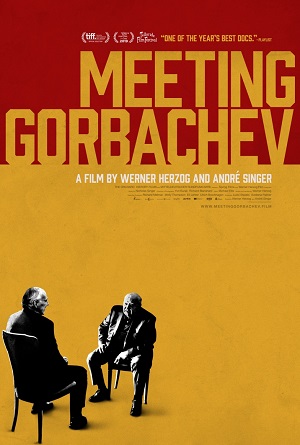
“We tried.”
Gorbachev once read that phrase on a friend’s tombstone and revealed to Werner Herzog that he would like those same two words to his embellish his epitaph.
On Friday May 3rd, the Los Angeles World Affairs Council screened Werner Herzog and André Singer’s documentary “Meeting Gorbachev.” The screening was followed by a Q&A led by Herzog himself.
Now 87 and battling illness, the visionary Mikhail Gorbachev, former General Secretary of the U.S.S.R, sat for three long interviews with Herzog. He was brought and taken away in an ambulance. Herzog, as on-screen interviewer, celebrated Gorbachev’s three remarkable accomplishments: negotiations with the U.S. to reduce nuclear weapons; cessation of Soviet control of Eastern Europe and the reunification of Germany; and the dissolution of the Soviet Union and Eastern Bloc.
Following the film, Herzog reminded the audience that Russian history remembers NATO’s eastward expansion as the next in a history of invasions marked by the Mongols, Tatars, Nazis, and Napoleon’s forces. Russia felt and still feels existentially threatened. In response to an audience question on the inevitably of nuclear war, Herzog surmised that war is “never inevitable” and added that the risk should be brought down and tamed.
When asked if Gorbachev expressed an opinion on Putin during the interviews, Herzog recalled that Gorbachev declined to speak about “ephemeral things.” According to Gorbachev, the conversation would have been centered on Obama and Clinton ten years ago. Since the names invariably change under each administration, Gorbachev preferred to base his responses in a historical context. Herzog acknowledged that while Gorbachev and Putin have different views, they respect each other. Putin worries about Gorbachev’s safety and sent the top bodyguards to care for Gorbachev. There is a segment of society that sees Gorbachev as a traitor and has threatened his life.
Herzog shared with the audience that Gorbachev is a very solitary man. In the film, Gorbachev admitted that his life was taken from him when his wife passed away. The film ends with Gorbachev reciting a melancholy poem by 19th century writer Mikhail Lermontov, which according to Herzog, transmits an “aura of sadness and the tragic soul of Russia.” Herzog learned that Gorbachev knows hundreds of poems by heart.
